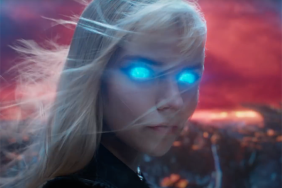CraveOnline: What did Solomon write about Patsey in the book?
Lupito Nyong’o: There’s one thing he says about Patsey, he says Patsey had an air of loftiness that neither labor nor lash could rid her of. That, for me, was the guiding quality of her, that she was this woman also described as genial and agile and pleasant tempered, and the fastest cotton picker in the bayou. She was called The Queen of the Fields. At the same time, she wished for her death. She was a person that was complex in that way and that lived in every moment so presently that she could go and pick those 500 lbs. of cotton by day and then ask someone to kill her by night.
She was always working through her pain, not wallowing in it. For me in reviving her, I wanted to honor that spirit, to do it with agency and dignity because that’s it. In the confines of slavery, this woman who was born in the industry still had an instinct for freedom and that’s what she was looking for. When she picks those 500 lbs. of cotton and when she asks Platt to kill her, she’s looking for comfort. She was looking for freedom. So for me, that’s humanity. Human beings have an instinct for freedom.
What aspects of your Yale training did you draw upon in playing Patsey?
Everything. I learned at Yale, one of the biggest lessons was to learn how special I am and therefore how totally unspecial I am. I was special among everyone else who was special. The fact that we’re all so individual and that’s what makes us special.
So being special doesn’t make you special.
Exactly! Oh my God, I’m going to use that.
You’re welcome.
Yeah, being special doesn’t make you special. It really doesn’t, so get on with it. Yeah, so in pursuing my work as an actor, it’s all about me but it’s not about me at all at the same time. So that paradox, it was something that really gave me a sense of balance and kept me in service to the work I was doing because this is a kind of role that an ego would destroy because it asks so much of you. Also, the fact that I was thrown into this thing with people that I’ve admired so deeply.
I was definitely very intimidated by being a part of that group. I panicked. I panicked. Surely he’s made a mistake and I’m going to receive a call and they’re going to tell me I’m fired. I know it. I know it, I know it and I felt that way until I arrived there but then I also recognized that I felt that way about so many other characters that I played while I was at Yale. There’s always a sense of newness with acting, because every role, you come to every role fresh. So recognizing that I could be comfortable in my discomfort and get on with the job.
People are going to talk about the whipping scene because it is so harrowing. It looked like a very technical scene, the way the camera moves away from you, moves back to you and there’s obviously a special effect. How technical was that scene?
You see it and yeah, you see what a feat it must have been to put together, but Steve is very good at relieving the actor of that kind of technical burden. He’s always looking for the human truth so he basically only gives you just enough of the technical aspect that he needs you to think about. So for me, obviously I wasn’t actually being whipped but I had to react to the crack of the whip. That whip was so close I could feel the wind of it, the wind it caused and then react to it.
Other than that, the camera work, the thing about Steve and [cinematographer] Sean Bobbitt is that they have such a shorthand with each other and their priority is so much in getting the human exchange between the actors that they are the ones who fuss about the camera. We don’t really get involved in it much.
Did you have an appliance on your back or were the lashes all done later?
No, no, no, I sat for four hours in makeup so it’s a combination of makeup and CGI.
Besides The Color People, what were the other movies and performances that inspired you?
I can speak of actors that I love. I love Cate Blanchett, Viola Davis, her tenacity. I love Charlize Theron. She’s so surprising and so exhilarating, the kinds of projects she takes on. Marion Cotillard as well. [They’re] women who’s work I look up to a lot and of course, Sidney Poitier. His background, the fact that he made a home for himself in this new land is something that I draw a lot of inspiration from.
Fred Topel is a staff writer at CraveOnline and the man behind Best Episode Ever and Shelf Space Weekly. Follow him on Twitter at @FredTopel.









